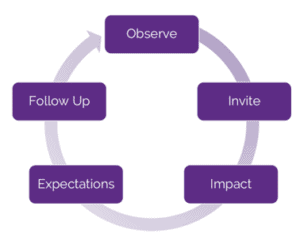In our latest leadership report, we discuss strategies for using a coach-like approach when giving feedback.
Using a Coach Approach in Feedback
When you hear the word “feedback,” what comes to mind? My guess is that it isn’t positive, whether you’re thinking of giving it or receiving it.
Feedback is hard and often brings up a lot of emotions for everyone. As leaders who are moving at 100 miles per hour we’re looking to:
- Find the right time and place
- Be clear and not confuse
- Ensure understanding
- Feel good about the conversation
- Ensure the receiver feels motivated and supported
This is a lot to fit into a conversation that ultimately is letting someone else know that in some way they aren’t meeting your expectations.
What we’ve noticed in talking with leaders about feedback over the years is that they often consider it a “difficult conversation” and therefore consciously or subconsciously try to keep it short and direct in the hopes that they can exit the conversation. Short and direct works with some, but not with all. So, to help with bringing the coach approach to feedback, we created a feedback cycle.

Leaders are typically good at identifying what could be better (Observe) and articulating what to do differently (Expectations). But as you can see there are 3 other steps in an effective feedback conversation that are key and missing.
1) Invite the person to the conversation by saying something like “Is now a good time to chat?”, “Tell me more about what happened here”.
2) If they don’t voluntarily share it, ask about the impact of the situation by saying something like “What’s the impact of this?” or “How does this affect others/timelines/the project?”
And the key ingredient:
3) Decide on a mutually agreeable time to follow up on what you talked about. Without follow up, there is less likely to be follow through. Say something like, “when should we check in on this again?”. It could be after an event that would showcase what they’re working on, or just in your next 1:1.
What would be different for you if you used a coach approach for feedback in this way? What would be different for those receiving your feedback?
If you’re interested in learning more about how we can help you or your team build coaching skills or build your feedback muscles reach out! Also, join us for our upcoming webinar on Compassionate Accountability, which is what this is all about. This approach to feedback is displaying compassion, while also holding others accountable.



